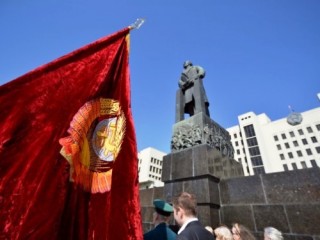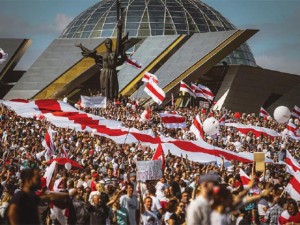He said Belarus would likely face economic tightening not only as a result of the coronavirus pandemic but also a Russian trade oil crisis that worsened this past winter.
Uladzimir Matskevich: Holidays is a very efficient way of controlling the masses

Belarusan and Russian authorities learned how to use mobilization of people through celebrations of historic dates given in a corresponding wrapper to their own benefit.
Belarus entered a prolonged period of state celebrations: 1st of May — the celebration of labor, 9th of May — the Victory Day, 3rd of July — the Independence Day. All these holidays, though with different names, were celebrated at the Soviet times, too.
How is Belarusan state using holidays for political purposes? Why did Lukashenko shift the Independence Day from July 27 to the day when Belarus was freed from the fascist occupants — July 3? Will Belarus be able to start a new life without rejecting Soviet holidays and symbols?
Uladzimir Matskevich, philosopher and methodologist, the head of the Board of the International Consortium “EuroBelarus“, answered the questions of the EuroBelarus Information Service.
— Belarus as an independent state has existed for 24 years now, but didn’t get its own celebrations yet. We are living with Soviet celebrations: February 23, May 1, and May 9... Is it that the independent country has nothing to celebrate?
— It is not exactly so: we have our own fixed Belarusan holidays. First of all, these are religious holidays — catholic and orthodox.
Whereas celebrations of international holidays and dates that we inherited from the Soviet Union is a tribute to traditions.
— Even the Soviet celebrations are transformed for the political needs of the regime: elsewhere in the world May 1 is celebrated as an international day of solidarity with the workers, while Belarus celebrates the labor holiday, which sounds almost as a feast during the plague during the economic crisis.
— Let’s mark that all regimes and all states are using holidays, including international ones, for their own purposes. 1 May is the Labor Day not only in Belarus; moreover, it is basically what it is, since the reason for setting this day as a holiday was the dispersal of a workers’ demonstration in Chicago in the late 19th century only to spread throughout the world later on. Both the trade unions and left parties used this holiday for ideological purposes — either to raise up workers for protests against the existing regimes or it was the state and communist socialist countries that used the holiday in order to mobilize the masses, influence them, and cultivate certain communist values in them.
The 1 May is a universal and common holiday, but in different times and in different countries it get an additional coloring, either becoming a form of protest, a victory of certain ideology or a solidarity day.
— After the start of the Russia-Ukraine Russia and Putin made a very vigorous attempt to usurp the Victory Day. But it was Lukashenko, who established a precedent when trying to attach special significance to Belarus in its victory over the fascists: apart from traditional Victory Day Lukashenko also moved the Independence Day to July 3 — the day when Minsk was freed from the Nazis...
— First let me talk about the specific interpretation of the World War II, which comprises the Great Patriotic War that is used as the only ideological core for today’s Belarusan regime and in some sense for the Putin’s regime, too. The authors of the new ideological doctrine based on the victory in the Great Patriotic War in Belarus and in Russia seem to be the same people. First they helped Lukashenko establish his regime getting use of the weak Belarusan statehood to perform this successful experiment in Russia later.
Accordingly, even the dates that were established over the short period of Belarus’ real independence, i.e. before Lukashenko’s came to power, were reviewed. Lukashenko simply couldn’t cancel the Independence Day, so he combined it with the day of Minsk liberation from Nazi occupants to make it fit better with the ideology he imposes on the Belarusan society.
— Ukraine is starting new life with Maidan and overthrow of Lenin’s statue. Would Belarusans be able to change their life if they don’t get rid of symbols and holidays of the Soviet past?
— I don’t think we will be able to go without it.
— The thing is that ideology, symbols, and holidays are a very efficient way of controlling the masses, the population, and the society. And all states are using holidays for their own purposes; Belarusan state is no exception.
During the 20 years Belarusan state has been cultivating revanchist Soviet ideology through mass events, celebrations, holidays, mass media, and schools. And after long-term cultivation of ideology Lukashenko states that Belarus isn’t ready to establishing democracy or integrating with Europe; but how can Belarus and its society be ready to it if during the two decades ideology has been drumming absolutely different values, aims, and opinions into people’s heads?
For the changes to take place smoothly we need to prepare people to these changes. We need to allow freedom of discussions and disputes over the sharpest ideological questions starting from the kindergarten and further is schools and universities. And only after public discussions of the acutest issues that the question can be put to referendum: to change or not to change the Constitution, to enter or not to enter the EU or to choose a specific mechanism of relations with the EU.
The freshest example is private property on land. Recently Lukashenko has stated that Belarusan society is ready to introduce private property on land. But how can it be ready if the ideological machine has been drumming into people’s heads how evil private property is for over two decades?
Such kind of ideological lies has a number of reasons: mobilization of masses through celebration of historic dates interpreted accordingly, through ideological indoctrination, through ban on public discussions or ban on scientific disputes and expert debates re interpretation of some historical events. History never has unequivocal or right interpretation; you can neither cancel nor efface historical events; you can just forget about them for some time. But ideological fight, fight of thoughts and approaches is led not about the realness of the events but about their interpretation.
In this meaning Russia apart from holidays related to the victory in the World War II or in the Great Patriotic War in 2005 introduced the holiday of November 4, when the army of the Polish-Lithuanian Commonwealth and the Grand Duchy of Lithuania were forced out of Moscow as far back as in the 17th century. Basically, the holiday of victory over Belarusans has been established. Russia is actively reviewing its history to the benefit of Putin’s ideology, and that is what differs Belarus’ attitude towards history. In Belarus, the victory in the Great Patriotic War and the tragedy of the Belarusan nation in the World War II forces out all historical memory and all historical past. Apart from cultivation of memory about the war, Russian ideology is also built on the new interpretation and distortion of the long-term Russian history, to the detriment of the independent Ukraine’s and Belarus’ nations as well.
Others
-
From farewell to a new Eastern policy and towards a new development
Poland and Germany were both initiators and drivers of a New Eastern policy linked to the Eastern neighborhood and Russia/Soviet Union.
-
Uladzimir Matskevich: The sooner the "Union State" is denounced, the better for Belarus
Not only does the “Union State” undermine the establishment of civilized relations with Europe, but it hinders the possibility of normal relations between Belarus and Russia.
-
Uladzimir Matskevich: The regime can no longer control the situation in the country
The authorities are unable to prolong the social contract with the people: there is no way out of the social crisis.
-
Press release of the BNP in connection with the next round of the dialogue in the format of the EU-Belarus Coordination Group
Belarusan National Platform of the Eastern Partnership Civil Society Forum welcomes the dialogue process in the format of the EU-Belarus Coordination Group, the third round of which was held in Minsk on 3-4 April 2017.








Comments
Andrei Yahorau — Al Jazeera: “Lukashenko is irresponsible”
He said Belarus would likely face economic tightening not only as a result of the coronavirus pandemic but also a Russian trade oil crisis that worsened this past winter.